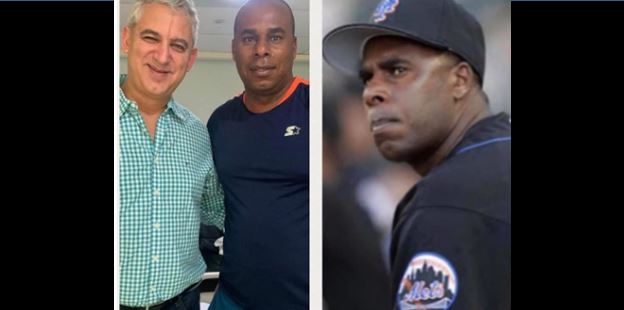NEW YORK, May 21, 2020 — Professional baseball icon, Jose Offerman, recently reflected on his bout with prostate cancer he battled last year. Offerman, former player for the LA Dodgers, Kansas City Royals, Boston Red Sox, and the New York Mets was diagnosed in August of 2019 and underwent robotic prostate cancer surgery with Dr. David Samadi, world renowned prostate cancer surgeon, at the Metropolitan Hospital of Santiago (HOMS) in the Dominican Republic.
“Jose was a trooper during the whole process. At first, he had concerns, but his warm, friendly, and positive attitude is what ultimately got him through those first several months after his diagnosis,” explained Dr. David Samadi, Director of Men’s Health and Urologic Oncology at St. Francis Hospital in Roslyn, New York. “Being the athlete Jose is he was determined to beat his prostate cancer. If it wasn’t for the necessary blend of strength and courage he displayed, he may not have done as extraordinarily well as he has.”
In 2014, Dr. David Samadi, a pioneer in robotic prostate surgery, opened the Samadi HOMS Robotic Institute at the Metropolitan Hospital of Santiago in the Dominican Republic. This was the first of its kind institute to open in the Caribbean. This institute has helped bring a greater level of prostate cancer treatment to this region of the world that was not available before.
President Danilo Medina of the Dominican Republic and CEO and President at HOMS Hospital, Dr. Rafael Sanchez Espanol, were instrumental in their leadership and vision for bringing Dr. Samadi and his team to educate, do research and perform robotic surgery technology to the Dominican Republic.
“My gratitude and heartfelt thanks of their generosity to invite me to have this tremendous opportunity in the Domincan Republic, has been ovewhelming,” exclaimed Dr. Samadi. “The people of this area are so kind and welcoming that it’s always a pleasure when I travel to the Dominican Republic.”
Ever since 2014, this institute has become a center of medical tourism for prostate cancer. Men and their spouses from all over the Caribbean, South America, and in the Dominican Republic, have gotten the message that they should get checked and to not wait for symptoms to appear. If they do, it could be too late.
The Samadi HOMS Robotic Institute has brought robotic surgery to this area to help not only save men’s lives from prostate cancer but also to preserve the quality of their lives in terms of sexual functioning and urinary continence. By using SMART technology, created by Dr. Samadi himself, this procedure is a minimally invasive robotic-assisted laparoscopic prostatectomy that aims at achieving the prostate cancer trifecta: complete removal of the cancerous prostate, full sexual functioning, and zero urinary incontinence.
“While some men may think its taboo and unmanly to get a digital rectal exam, it literally can save their lives,” stated Dr. Samadi. “Both the digital rectal exam and PSA blood tests are fundamental screening exams necessary to help find prostate cancer at its earliest stage – the earlier it’s found, the better the survival rate.”
Offerman, who currently lives in and is from the Dominican Republic, wanted to open up about his experience of prostate cancer and to get the message out reminding men the importance of getting their prostate checked. At the time of his diagnosis last August, Offerman was just 50 years of age. Many people had concerns about his health and were curious how he was doing after the diagnosis.
“Jose is still a young man and if he had not gotten a prostate specific antigen (PSA) test when he did, his prostate cancer would have very likely gone unnoticed until it would have spread beyond the prostate, making it more difficult to successfully treat,” explained Dr. Samadi. “This is exactly why I firmly believe all men should have a baseline PSA test beginning at age 40 and then depending on risk factors they may have, we can either test yearly or every few years.”
After his diagnosis, Offerman underwent robotic surgery. He is now in remission but takes a daily pill and a monthly injection and will eventually begin the radiotherapy process.
“My goal when I treat any man for prostate cancer is to make it personalized medicine specifically for their medical issues with the goal to eradicate their cancer for good,” exclaimed Dr. Samadi. “Men should not wait to be tested for their PSA level. I cannot emphasize enough the importance of getting annual physicals and discussing with their doctor when to begin PSA testing.”
Dr. Samadi explained that surgery is preferred over radiation for men with a high PSA and a more aggressive cancer. That’s because once a man goes through surgery, if there’s any microscopic cancer cells still left, then radiation can be used to clean those up. If radiation is done first as the primary treatment, if the cancer were to return, it is practically impossible to do surgery at that point.
At the institute in the Dominican Republic, Dr. Samadi has performed hundreds of robotic prostate cancer surgeries. Every surgery is performed by Dr. Samadi and his team so that there is a continuity of care which is critical. Every month, Dr. Samadi, with his team, travels to the Dominican Republic to teach, and to perform robotic prostate cancer surgeries and to see his patients personally.
“I believe in a hands-on approach with every patient I see,” said Dr. Samadi. “My goal has always been to help men achieve their best health to fully enjoy and experience everything life has to offer. By educating men to take care of their prostate by getting regular screening for prostate cancer, this opens their eyes to how having a healthy prostate leads to preservation of what’s important to many men – good urinary functioning and quality sex. Exactly what men want.”

